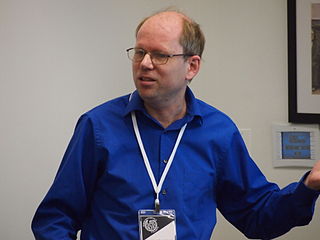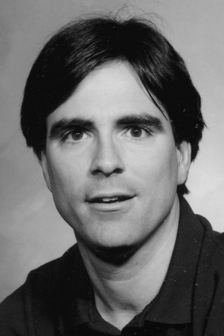
Carnegie Mellon University (CMU) is a private research university in Pittsburgh, Pennsylvania. Established in 1900, the Carnegie Institute of Technology merged with the Mellon Institute of Industrial Research to form the university as a single institution.

The School of Computer Science (SCS) at Carnegie Mellon University in Pittsburgh, Pennsylvania, US is a school for computer science established in 1988. It has been consistently ranked among the top computer science programs over the decades. As of 2022 U.S. News & World Report ranks the graduate program as tied for second with Stanford University and University of California, Berkeley. It is ranked second in the United States on Computer Science Open Rankings, which combines scores from multiple independent rankings.

Dabbala Rajagopal "Raj" Reddy is an Indian-born American computer scientist and a winner of the Turing Award. He is one of the early pioneers of artificial intelligence and has served on the faculty of Stanford and Carnegie Mellon for over 50 years. He was the founding director of the Robotics Institute at Carnegie Mellon University. He was instrumental in helping to create Rajiv Gandhi University of Knowledge Technologies in India, to cater to the educational needs of the low-income, gifted, rural youth. He is the chairman of International Institute of Information Technology, Hyderabad. He is the first person of Asian origin to receive the Turing Award, in 1994, known as the Nobel Prize of Computer Science, for his work in the field of artificial intelligence.

Scott Elliott Fahlman is a computer scientist and Professor Emeritus at Carnegie Mellon University's Language Technologies Institute and Computer Science Department. He is notable for early work on automated planning and scheduling in a blocks world, on semantic networks, on neural networks, on the programming languages Dylan, and Common Lisp, and he was one of the founders of Lucid Inc. During the period when it was standardized, he was recognized as "the leader of Common Lisp." From 2006 to 2015, Fahlman was engaged in developing a knowledge base named Scone, based in part on his thesis work on the NETL Semantic Network. He also is credited with coining the use of the emoticon :-).

John Mark Ockerbloom is a digital library architect and planner in the library science field. Formerly at Carnegie Mellon University, from which he earned a PhD in computer science, he now works for the University of Pennsylvania. He is the editor of The Online Books Page, which lists over two million books including project Gutenberg titles, all of which are freely available for reading online or by download.

The Mellon Institute of Industrial Research is a former research institute in Pittsburgh, Pennsylvania, United States, which is now part of Carnegie Mellon University. It was founded in 1913 by Andrew Mellon and Richard B. Mellon as part of the University of Pittsburgh, and was originally located in Allen Hall. After becoming an independent research center and moving to a new building on Fifth Avenue, the Mellon Institute subsequently merged with the Carnegie Institute of Technology in 1967 to form Carnegie Mellon University. While it ceased to exist as a distinct institution, the landmark building bearing its name remains located at the corner of Fifth Avenue and Bellefield Avenue in Oakland, the city's university district. It is sited adjacent to The Carnegie Mellon Software Engineering Institute (SEI) and the University of Pittsburgh's Bellefield Hall and is across Bellefield Avenue from two other local landmarks: the University of Pittsburgh's Heinz Memorial Chapel and the Cathedral of Learning.
The Marianna Brown Dietrich College of Humanities and Social Sciences is the liberal and professional studies college and the second-largest academic unit by enrollment at Carnegie Mellon University in Pittsburgh, Pennsylvania, USA. The college emphasizes study through rigorous analysis and technology of the behaviors, institutions, and beliefs that constitute the human experience, describing itself as “not an ordinary liberal arts school.” The college was named for Marianna Brown Dietrich, the mother of philanthropist William S. Dietrich II, after his donation of $265 million to the university in 2011 – the largest single donation in Carnegie Mellon history.
Formal epistemology uses formal methods from decision theory, logic, probability theory and computability theory to model and reason about issues of epistemological interest. Work in this area spans several academic fields, including philosophy, computer science, economics, and statistics. The focus of formal epistemology has tended to differ somewhat from that of traditional epistemology, with topics like uncertainty, induction, and belief revision garnering more attention than the analysis of knowledge, skepticism, and issues with justification.
The International Association for Computing and Philosophy (IACAP) is a professional, philosophical association emerging from a history of conferences that began in 1986. Adopting its mission from these conferences, the IACAP exists in order to promote scholarly dialogue on all aspects of the computational/informational turn and the use of computers in the service of philosophy.

Frank Pfenning is a German-American professor of computer science, adjunct professor in the department of philosophy, and head of the Computer Science Department at Carnegie Mellon University.

Randolph Frederick Pausch was an American educator, a professor of computer science, human–computer interaction, and design at Carnegie Mellon University (CMU) in Pittsburgh, Pennsylvania.
Margaret Morrison Carnegie College (MMCC) was the women's college for Carnegie Mellon University. It was founded in 1903 and opened its doors to students in 1906 as the Margaret Morrison Carnegie School for Women. The school was closed in 1973.

Krzysztof "Kris" Matyjaszewski is a Polish-American chemist. He is the J.C. Warner Professor of the Natural Sciences at the Carnegie Mellon University Matyjaszewski is best known for the discovery of atom transfer radical polymerization (ATRP), a novel method of polymer synthesis that has revolutionized the way macromolecules are made.

Manuela Maria Veloso is the Head of J.P. Morgan AI Research & Herbert A. Simon University Professor in the School of Computer Science at Carnegie Mellon University, where she was previously Head of the Machine Learning Department. She served as president of Association for the Advancement of Artificial Intelligence (AAAI) until 2014, and the co-founder and a Past President of the RoboCup Federation. She is a fellow of AAAI, Institute of Electrical and Electronics Engineers (IEEE), American Association for the Advancement of Science (AAAS), and Association for Computing Machinery (ACM). She is an international expert in artificial intelligence and robotics.
David Andreoff Evans is an American scientist in the field of computational linguistics, best known for his research into indexing using natural language processing, and in ontology learning, especially in medical informatics.
Clark N. Glymour is the Alumni University Professor Emeritus in the Department of Philosophy at Carnegie Mellon University. He is also a senior research scientist at the Florida Institute for Human and Machine Cognition.

Jeremy Avigad is a professor of philosophy at Carnegie Mellon University.

The Computational Biology Department (CBD) is a division within the School of Computer Science at Carnegie Mellon University in Pittsburgh, Pennsylvania, United States. It is located in the Gates-Hillman Center. Established in 2007 by Robert F. Murphy as the Lane Center for Computational Biology with funding from Raymond J. Lane and Stephanie Lane, CBD became a department within the School of Computer Science in 2016.
Daniel P. Siewiorek is an American computer engineer and computer scientist, currently the Buhl University Professor Emeritus of Electrical and Computer Engineering and Computer Science at Carnegie Mellon University.
Mandy Simons is a linguist and professor in the Department of Philosophy at Carnegie Mellon University (CMU). She researches semantics and pragmatics, in particular phenomena like presupposition and projection.











